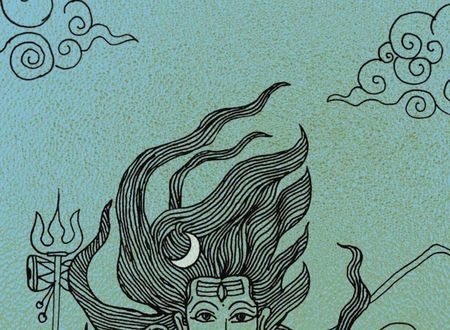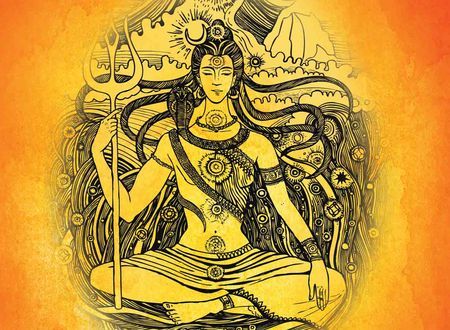In Indian villages, even today, when an elephant passes through a village, all the elders gather and fold their hands in reverence. They also nudge the children to do the same and bow to the majestic pachyderm. “This is Lord Ganesha,” they say. And the kids quickly bring their hands together in reverence and holler, “Ganapati Bappa Morya!” and so on. The women step out of their homes to offer sweetmeats, lentils, flour, fruits and veggies to the mahout. Some feed the elephant bananas and sugarcane.
While this procession is on the move, a fascinating, though unsettling, thing happens: all the stray dogs of the village, puppies included, start following the elephant, barking and growling relentlessly.
What problem could the dogs possibly have with the elephant? It’s not like they are a match in any way. What competition could the hounds and pooches pose to the mighty tusker?
I’m sure if someone could ask the dogs the reason for their incessant barking, they would answer, “We have no problem with the elephant per se. It’s these people folding hands and offering all that food to the elephant that bothers us.”
But, the dogs don’t have the nerve to jump in front of the elephant or block his way. They will never come in front and will never stop barking from the back.
And so is the way of the world—the more the number of those who look up to you and stand in front with gifts, the greater the number of those who will bark behind you.
The elephant, however, never stops to shoo away the dogs or to tackle them. It keeps on walking, indifferent to the uncouth and clownish behavior of the dogs. But what makes the elephant truly unique and masterful is not just that it doesn’t stop for the dogs. It’s something more profound.
If the elephant doesn’t stop for the dogs, it doesn’t halt for the ones bowing in reverence either.
It remains unmoved by both the glory and the growls. Our true self is beyond praise and criticism, it is beyond disease, death and decay. It shines in its own splendor. (Though a common analogy, someone had shared this story with me from a discourse by Swami Rajeshwaranand.)
The emotions we experience when showered with praises or hit with criticism are temporary feelings that mostly arise when we forget how incredibly empowered and powerful we truly are.
The path of success is littered with opinions and suggestions.
Everyone you meet will have some kind of an opinion and you are likely to cross paths with many who won’t believe in you. They will give you a million reasons why you will fail. It’s alright, that’s all they know. You’ll also meet some who may offer you false praise, just to attain a desired outcome. It’s the way of the material world. Then you’ll also meet some who are genuine and will influence your life in a phenomenal way.
Like the elephant, if you can keep your head on your shoulders and remain unmoved by such people and have faith in your own conviction as well as the wisdom to know when and how much to listen to someone, success is yours for the taking.
When I sat down to write this book, in fact, I should say when I stood up to write this book (because I do all my writing while walking on a treadmill desk), there was no confusion in my mind as to what I wished to say. I felt there was no need for me to reinvent the wheel. Wiser words by more brilliant people have been written before me and the same will continue after me. But, what if we could take some cues from our Vedic wisdom and approach success as a journey and not attainment. I felt we would end up with powerful principles and insights that anyone could use in their daily life.
An understanding of the self—that you are not a product of the opinions of others but of your own thoughts, feelings and actions—is critical to attaining supreme success in any endeavor you wish to undertake.
Who, what and how you are is infinitely more important than how you plan to embark on your journey of success.
The S in Self represents the S of the Sacred Principle. But, this S could also mean many other things. Sale, for example. Just as a person cannot exist without a self, no business can survive without a profitable sale…
This was an excerpt from my latest book, The Heart of Success, published by Jaico Publishing. It was on my mind to share with you the first chapter but it’s already available on Amazon, so I shared the third chapter instead. In this book, I introduce you to the Sacred principle of success, as I call it. Where S in Sacred stands for Self in a spiritual context or Sale in the business world. And, ACRED stands for, wait a minute, it’s an anagram of CARED and it contains READ. So, if you care to read it, you’ll know what it stands for. Better be quick because more reading material’s coming for you in November!
Available in both Kindle and paperback, here are the links:
Peace.
Swami
A GOOD STORY
There were four members in a household. Everybody, Somebody, Anybody and Nobody. A bill was overdue. Everybody thought Somebody would do it. Anybody could have done it but Nobody did it.
Don't leave empty-handed, consider contributing.It's a good thing to do today.









Comments & Discussion
12 COMMENTS
Please login to read members' comments and participate in the discussion.